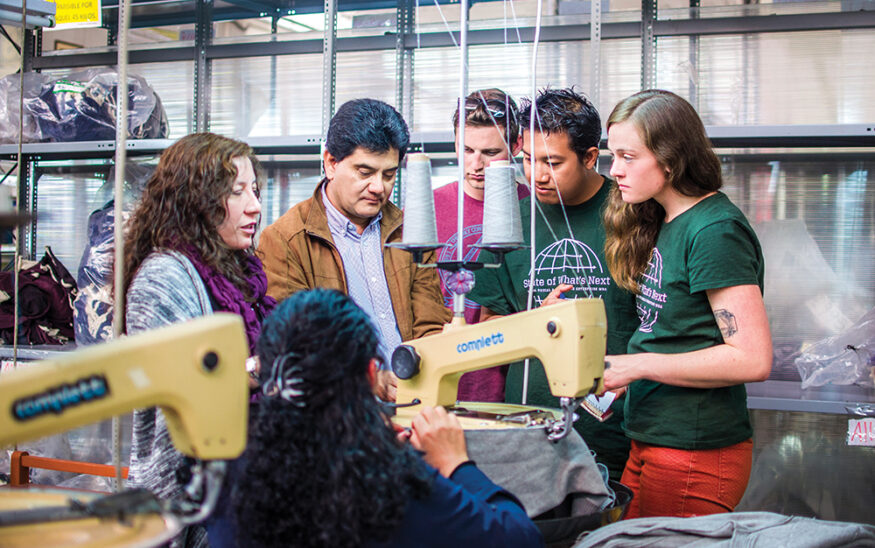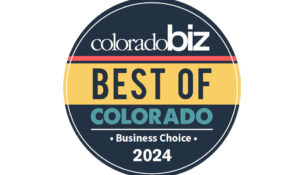Getting an A+ in Making the World a Better Place
Social entrepreneur programs guide students who want to help their communities
Nora Caley //April 8, 2018//


Getting an A+ in Making the World a Better Place
Social entrepreneur programs guide students who want to help their communities
Nora Caley //April 8, 2018//

Students who want to make a difference in their communities — and build viable businesses — are finding opportunities to do both. Local colleges and universities are offering programs in social entrepreneurship, also called social enterprise, in Colorado and beyond to meet this evolving student demand.
“It is definitely part of the trend in the millennial generation of wanting to both be able to make a living and make a life,” says Rebecca Arno, director of the Barton Institute for Philanthropy and Social Enterprise at the University of Denver. “They want to put market forces to work addressing social issues.”
The Barton Institute recently launched the Social Enterprise Fellowship Program, which deploys six teams of graduate students to projects at area organizations. For example, one team will help Access Gallery develop a market for corporate artwork created by artists with disabilities, while another team creates a business and engagement strategy for the barbershop and salon at Emily Griffith Foundation.
Arno says the program attracted graduate students from the law, business, environmental, art, international development, social work and economics schools. The program is co-curricular, which means students get paid but they do not earn credit for the 10 hours a week they dedicate to these projects. “It is over and above their course load and workload,” she says.
Students of all academic disciplines want to use creativity and innovation to solve community problems. “When you hear entrepreneurship you think business, but really it’s anybody and everyone on campus,” says Sarah Engel, assistant director of the Jake Jabs Center for Entrepreneurship at CU Denver Business School. The center offers an entrepreneurship curriculum for undergraduate, graduate and continuing education students.
Engel points to several projects by CU Denver students that have grown into viable businesses. Nokero, which makes solar-powered light bulbs for third world countries to use instead of dangerous kerosene lanterns, is run by a former student and won a business plan competition at the center several years ago. More recently, engineering students who worked on revamping shipping containers into sustainable living spaces in Haiti now run a program called Project [un]Contained. Another group of engineering students is currently working on a smart walking cane that talks to the user.
Students have long wanted to help the community. The difference now is social media, and the ability to find out what needs to change. “Our students have access to the entire world,” Engel says. “That’s one of the drivers.”
At Colorado State University, which launched the Global Social and Sustainable Enterprise (GSSE) MBA more than 10 years ago, students build a business as part of their degree coursework. The ventures cover a range of topics, such as palm oil deforestation in Indonesia, the pollinator crisis in Colorado, energy issues in Uganda, and an alpaca supply team in Peru. “They are driven by student interests,” says Kat Ernst, program manager of the GSSE MBA.
It’s not just millennials who want their businesses to positively impact the world. The GSSE MBA students span all ages and all career levels. “We believe the world’s complex global challenges aren’t going to be solved without diversity,” Ernst says. Some students have a traditional business background and decide they want to do something more fulfilling. Others are from the nonprofit space and want to build their skill set.
One misconception, Ernst says, is that social enterprise is just a new term for nonprofit. “We are an MBA program, so we come from the for-profit world,” she says. “We’re very much about the business model approach and scalability.”
Some nonprofits do look to social enterprise to help with fundraising and other processes.
“For nonprofit organizations, many are seeing a steady rise in demand for their services along with the challenge of increasingly unpredictable sources of funding,” says Josef Scarantino, director of social enterprise for the nonprofit organization Community Resource Center (CRC) in Denver. “Over time, social enterprise and other earned income strategies help nonprofits become much more resilient with the added benefit of multiplying the impact of their services.”
CRC recently launched the Colorado Nonprofit Social Enterprise Exchange to assist nonprofits in understanding, developing and capitalizing on social ventures. Scarantino says four organizations are participating in the 2018 cohort program, with each organization committing an average of four members of their leadership and board to participate. “We’re also benefiting from the tremendous support of generous business mentors and speakers with a wide variety of expertise to offer these organizations.”
Other entities are also assisting social entrepreneurs as part of a broader mission to assist entrepreneurs. At Johnson & Wales University’s Denver Campus Small Business Development Center (SBDC), faculty and students consult with new business startups. “They create value statements on why they’re forming the business, not just to make a profit but to serve the population,” says Jeff Gilbert, assistant professor in the College of Business at JWU.
Gilbert estimates that of the approximately 150 businesses working with the SBDC, about 25 percent have a social enterprise element, such as buying local products or offering volunteer hours to community nonprofits. “They still want to make a profit, but they have a responsibility to the community,” he says.

























